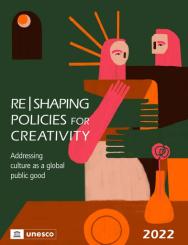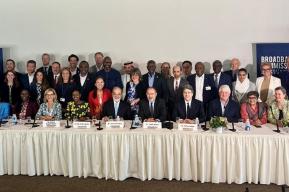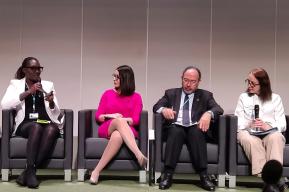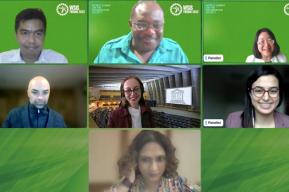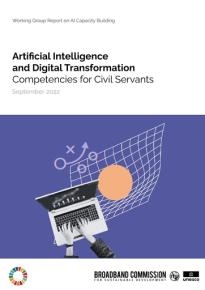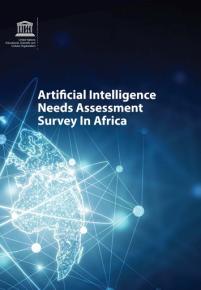
World Summit on the Information Society (WSIS)
With its unique mandate and human rights-based approach, UNESCO leads international efforts to respond to challenges arising from rapid technological advancements in its fields of competence: through standard setting, policy advice and capacity building, UNESCO provides its Member States and the international community the tools to advance digital cooperation for the benefit of all and realize the vision of the World Summit on the Information Society (WSIS) of building “a people-centered, inclusive, and development-oriented Information Society.”
Through its review process, it functions as a standard setter for new forms for digital regulation, creating digital enabling environments and protecting societies, setting international standards ranging from Artificial Intelligence (AI), virtual realities, and metaverses, to blockchain, emergent quantum computing, and neurotechnology.
What is WSIS?
An UN summit organized in two phases, Geneva 2003 and Tunis 2005, WSIS gathered 175 countries to with the goal of building “a people-centered, inclusive, and development-oriented Information Society”. Since then, many WSIS-related events have been held, including the annual WSIS Forums, as well as the review process WSIS+10 and the forthcoming WSIS+20. Here, UNESCO created the concept of Knowledge Societies, placing emphasis on inclusivity, diversity, and the empowerment of individuals and communities by transforming information into applicable knowledge. At the same time, UNESCO is leading the facilitation of five WSIS Action Lines as part of its work toward bridging digital divides and improving accessibility for everyone. Aligning itself with the UN Secretary-General Common Agenda, the process for a Global Digital Compact (GDC) and the Sustainable Development Goals (SDGs), the WSIS Forum and UNESCO aim to effectively address the challenges and opportunities of digitalization, bridge digital divides, and improve accessibility for everyone through a multi-stakeholder approach.
Key Figures
Normative Instruments
Action Lines
UNESCO actively contributes to numerous WSIS Action Lines and serves as the lead-facilitator for five of them.
More links
- Broadband Commissioners meet at the 2023 WSIS Forum in Geneva
- ROAM-X Indicators | UNESCO
- International Day for Universal Access to Information | UNESCO
- Global Media and Information Literacy Week 2023 | UNESCO
- AI and the Rule of Law: Capacity Building for Judicial Systems | UNESCO
- Digital Capacity Building for Governments | UNESCO
- Open Educational Resources | UNESCO
- Open science | UNESCO
- Digital Learning Week | UNESCO
- Gateways to Public Digital Learning | UNESCO
- ICT transforming education in Africa | UNESCO
- Digital Transformation Collaborative | UNESCO
- The World Atlas of Languages | UNESCO WAL
- World Heritage Centre - Dive into Heritage (unesco.org)
- UNESCO-Aschberg programme for artists and cultural professionals | Diversity of Cultural Expressions
- Convention for the Safeguarding of the Intangible Cultural Heritage | UNESCO
- MONDIACULT 2022 | UNESCO
- Internet for Trust | UNESCO
- Social Media 4 Peace | UNESCO
- Ethics of Artificial Intelligence | UNESCO
WSIS Forums throughout the years
WSIS Forum 2023: 13-17 March 2023, Geneva, Switzerland; April - May 2023, Virtual
WSIS Forum 2022: 15 March 2022, Virtual; 30 May - 3 June 2022, Geneva, Switzerland
WSIS Forum 2021: 17-21 May 2021, Virtual
WSIS Forum 2020: 7-10 September 2020, Virtual
WSIS Forum 2019: 8-12 April 2019, Geneva, Switzerland
WSIS Forum 2018: 19-23 March 2018, Geneva, Switzerland
WSIS Forum 2017: 12-16 June 2017, Geneva, Switzerland
WSIS Forum 2016: 2-6 May 2016, Geneva, Switzerland
WSIS Forum 2015: 25-29 May 2015, Geneva, Switzerland
WSIS+10 High-Level Forum: 10-13 June 2014, Geneva, Switzerland
WSIS Forum 2013: 13-17 May 2013, Geneva, Switzerland
WSIS Forum 2012: 14-18 May 2012, Geneva, Switzerland
WSIS Forum 2011: 16-20 May 2011, Geneva, Switzerland
WSIS Forum 2010: 10-14 May 2010, Geneva, Switzerland
WSIS Forum 2009: 18-22 May 2009, Geneva, Switzerland
News
Documents


